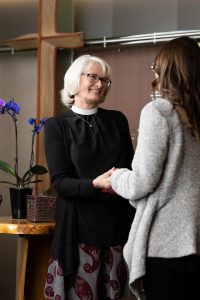We all experience good days and bad days when it comes to our mental health, but mental wellness can be difficult to talk about. However, suicide and other mental health diagnoses are common across the United States. In fact, mental wellness has been identified by all 17 Centura Health hospitals in Colorado and Kansas as the one of the most pressing health needs in the communities they serve. Recognizing that the brain is as important to whole person health as the heart, lungs or bones, Centura is committed to better addressing mental wellness for their associates, patients and communities.
One way Centura is working to improve the mental wellness of their communities is by offering scholarships for community leaders to become Mental Health First Aid (MHFA) Instructors. Instructors are then able to train community members about how to identify risk factors and warning signs for mental health and addiction concerns, how to talk about these concerns, strategies that can be used to help someone – family, friends, neighbors and colleagues – in both crisis and non-crisis situations, and information about where to turn for help. Just as CPR helps you assist an individual having a heart attack until first responders arrive, MHFA helps you know how to assist someone struggling with mental health or substance use and appropriately connect them with help.
appropriately connect them with help.
As part of a faith-based health care system, Centura leaders understand how critical faith-based organizations and religious communities can be in supporting mental wellness. Faith leaders and communities are often the first point of contact when people and families are struggling with a mental health need or substance abuse disorder. Many people will turn to their pastor, priest or other faith leader before they seek help from a mental health professional.
To help ensure the people in our communities have a better understanding of mental wellness, Centura has begun a Faith Partnerships for Mental Health initiative to provide MHFA instructor training to local faith organizations. Jim Feldbush, Director of Mission Integration at Centura-Porter Adventist Hospital, and Monica Buhlig, Denver Metro Group Director of Community Health, have reached out to Denver-area faith leaders to educate them on the benefits of MHFA training for their congregations and the role they could play as an MHFA instructor. Open to leaders from all faiths, these trainings equipped participants to provide MHFA classes to their own congregations and communities, expanding the growing network of individuals who are better equipped to help and support each other.
“MHFA training is a huge benefit for my congregation,” said Elder Mickey Mallory, who has been highly supportive of Centura’s MHFA program and helped recruit a group of local Adventist pastors to attend instructor training this spring. “A lot of people are uncomfortable responding or don’t know how to intervene when they see someone experiencing a mental health crisis. Thanks to MHFA training, I can not only provide more effective help to people who come to me in need, but I’m also able to pass on what I’ve learned to help ensure the people in my community have the tools and confidence to take action that can ultimately save lives.”
This Centura partnership enables MHFA Faith-Based Instructors to focus on recovery and resiliency. The program emphasizes that when we experience a mental health challenge, we can and do get better and can use our strengths to stay well. The trainings offered by MHFA Instructors are a way to embed a growing number of MHFA-trained individuals in communities across the greater Denver area and are helping to build a supportive infrastructure of people who can not only intervene, but also facilitate open conversations and provide ongoing support within the community.
“MHFA truly is an extension of our healing ministry. It takes a community supportive of whole person well-being to address mental wellness in a way that helps people feel connected and loved,” Monica said. “We are creating a system of support that extends to everyone in our communities, regardless of mental health status.”










